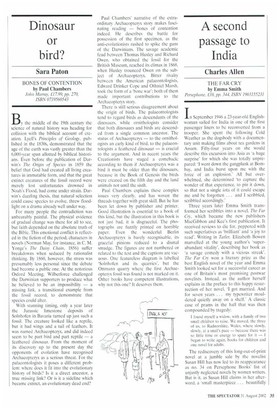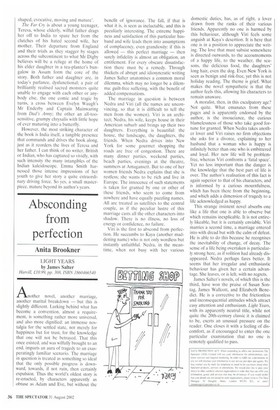A second passage to India
Charles Allen
THE FAR CRY by Emma Smith Persephone, £10, pp. 344. ISBN 1903155231 In September 1946 a 23-year-old Englishwoman sailed for India in one of the first passenger liners to be reconverted from a trooper. She spent the following Cold Weather as the dogsbody with a documentary unit making films about tea gardens in Assam. Fifty-four years on she would describe this excursion into Asia as 'a huge surprise' for which she was totally unprepared: went down the gangplank at Bombay, and India burst upon me with the force of an explosion.' All but overwhelmed, she determined 'to capture the wonder of that experience, to pin it down, so that not a single iota of it could escape me and be forgotten . . . and I scribbled, scribbled accordingly.'
Three years later Emma Smith transformed her scribbles into a novel, The Far Cly, which became the new publishers MacGibbon and Kee's first publication. It received reviews to die for, peppered with such superlatives as 'brilliant' and 'a joy to read'. Writing in Miler, Elizabeth Bowen marvelled at the young author's 'superabundant vitality', describing her book as 'a savage comedy with a vicious streak'. The Far Cry won a literary prize as the best English novel of the year and Emma Smith looked set for a successful career as one of Britain's most promising postwar novelists. Instead, as the author herself explains in the preface to this happy resurrection of her novel, I got married. And for seven years .. . my typewriter mouldered quietly away on a shelf.' A classic case of prams in the hall that was then compounded by tragedy:
I found myself a widow, with a family of two small children to raise. We moved, the three of us, to Radnorshire, Wales, where slowly, slowly, at a snail's pace — because there was so little time or energy to spare for it — I began to write again, books for children and one novel for adults.
The rediscovery of this long-out-of-print novel at a jumble sale by the novelist Susan Hill has now led to its reappearance as no. 34 on Persephone Books' list of unjustly neglected novels by women writers. But is it, as Susan Hill claims in her afterword, a 'small masterpiece . .. beautifully shaped, evocative, moving and mature'.
The Far Cry is about a young teenager, Teresa, whose elderly, wilful father drags her off to India to spare her from the clutches of his hated second wife, her mother. Their departure from England and their trials as they stagger by stages across the subcontinent to what Mr Digby believes will be a refuge at the home of his elder daughter in a tea-planter's bungalow in Assam form the core of the story. Both father and daughter are, in today's parlance, dysfunctional; a pair of brilliantly realised sacred monsters quite unable to engage with each other or anybody else, the one comic and tragic by turns, a cross between Evelyn Waugh's Mr Enderby and Captain Mainwaring from Dad's Army; the other an all-toosensitive, grumpy chrysalis with little hope of ever maturing into a butterfly.
However, the most striking character of the book is India itself, a tangible presence that commands and drives the book along, just as it reorders the lives of Teresa and her father. I can think of no writer, British or Indian, who has captured so vividly, with such intensity the many intangibles of the Indian kaleidoscope. Emma Smith harnessed those intense impressions of her youth to give her story a quite extraordinary driving force. So yes, a small masterpiece, mature beyond its author's years.



























































 Previous page
Previous page